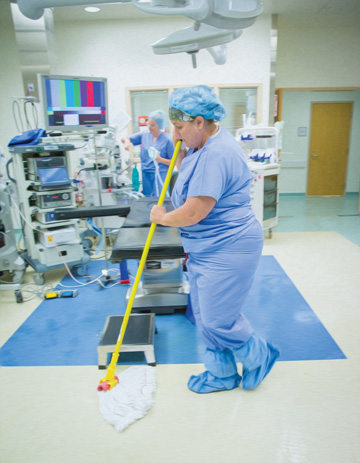Dr. Wright was chief of perioperative services and surgeon-in-chief at SickKids Hospital Toronto when he was tasked with improving efficiencies within the surgical department, including a focus on improving first case on-time starts. Focusing
on starting first cases of the day at eight o’clock sharp was just the beginning of the journey for Dr. Wright and his team. It served as an initial focal point around which they developed a collective pride. It also made the start
of the day feel less rushed and set the team down the path of efficiency-minded, safe patient care that carried throughout the day.
He admits making change happen is relatively easier in children’s hospitals, where the level of cooperation tends to be greater, but believes steps can be taken to drive positive change in general care surgical facilities, even if it
might take more work to accomplish it.
• Aligned interests. Dr. Wright met with the hospital’s perioperative chiefs and asked a simple question: How can we start cases on time? They told him tardy surgeons should be fined and punctual physicians should be paid.
“That could have worked, but I suggested we do it for the right reason — running an efficient department is better for patients and their families,” says Dr. Wright. “Efforts to improve efficiencies should align with
what drives healthcare providers. Couching it as a way to improve patient care will establish a culture that’s sustainable.”
Dr. Wright acknowledges initiating a culture change is difficult, so it’s important to keep members of the surgical team informed of small victories that build momentum toward big progress. Make it clear that change will happen through
teamwork and collegiality. Dr. Wright believes in collective accomplishments and dealing with low-performing providers or those who push back against change on an individual basis. Some providers don’t take suggestions for change
well. He pulls them aside and says, “This seems like a good idea to implement, why aren’t you buying in?”
• Morning huddles. Still, despite the best of intentions from Dr. Wright and his leadership team, late-arriving staff members and surgeons would be found lingering in the locker room or lounge. “The start of a case is only
as fast as the last person to show up,” he points out.
The question then became how to hold every member of the surgical team accountable for showing up on time and ready to operate. “We decided the best way to get everyone on board was to gather as a team before the first case of the day,”
says Dr. Wright.
Surgeons, nurses, anesthesia providers and clinical managers gather each morning in an operating room — so they’re out of the way of foot traffic — and run down a checklist of the day’s cases to plot out the needs of
the clinical team. Daily huddles generate communication among staff members, ensure everyone is on the same page moving forward and provide an opportunity for colleagues to get to know each other on a personal level, which carries over
into the OR and can improve collaboration and teamwork.
The huddles also ensure members of the surgical team are present and accounted for 15 minutes before the first case is scheduled to begin, a factor that helps to improve on-time starts. “Huddles were an important step forward and critical
to the success of the initiative,” says Dr. Wright.
Inspiring change is exhausting and requires relentless effort, concedes Dr. Wright. “My advice would be to keep hammering away,” he says. “Making sure clinical managers and frontline workers understand they’re in it
together creates a uniform commitment to making meaningful improvements. Departmental structures need to align to deliver health care effectively and efficiently.”
.svg?sfvrsn=be606e78_3)

.svg?sfvrsn=56b2f850_5)